Fleurs du Mal Magazine


Or see the index
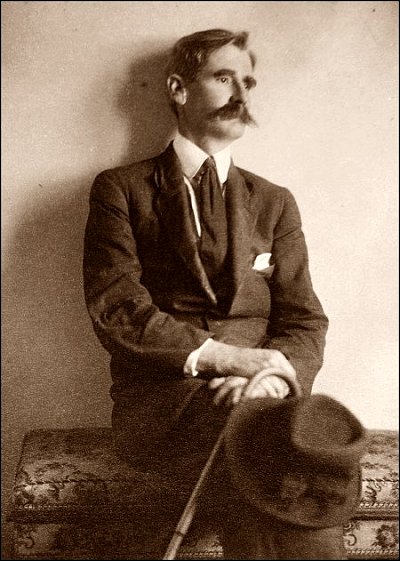
Henry Lawson
(1867-1922)
Knocked Up
I’m lyin’ on the barren ground that’s baked and cracked with drought,
And dunno if my legs or back or heart is most wore out;
I’ve got no spirits left to rise and smooth me achin’ brow —
I’m too knocked up to light a fire and bile the billy now.
Oh it’s trampin’, trampin’, tra-a-mpin’, in flies an’ dust an’ heat,
Or it’s trampin’ trampin’ tra-a-a-mpin’
through mud and slush ‘n sleet;
It’s tramp an’ tramp for tucker — one everlastin’ strife,
An’ wearin’ out yer boots an’ heart in the wastin’ of yer life.
They whine o’ lost an’ wasted lives in idleness and crime —
I’ve wasted mine for twenty years, and grafted all the time
And never drunk the stuff I earned, nor gambled when I shore —
But somehow when yer on the track yer life seems wasted more.
A long dry stretch of thirty miles I’ve tramped this broilin’ day,
All for the off-chance of a job a hundred miles away;
There’s twenty hungry beggars wild for any job this year,
An’ fifty might be at the shed while I am lyin’ here.
The sinews in my legs seem drawn, red-hot — ‘n that’s the truth;
I seem to weigh a ton, and ache like one tremendous tooth;
I’m stung between my shoulder-blades — my blessed back seems broke;
I’m too knocked out to eat a bite — I’m too knocked up to smoke.
The blessed rain is comin’ too — there’s oceans in the sky,
An’ I suppose I must get up and rig the blessed fly;
The heat is bad, the water’s bad, the flies a crimson curse,
The grub is bad, mosquitoes damned — but rheumatism’s worse.
I wonder why poor blokes like me will stick so fast ter breath,
Though Shakespeare says it is the fear of somethin’ after death;
But though Eternity be cursed with God’s almighty curse —
What ever that same somethin’ is I swear it can’t be worse.
For it’s trampin’, trampin’, tra-a-mpin’ thro’ hell across the plain,
And it’s trampin’ trampin’ tra-a-mpin’ thro’ slush ‘n mud ‘n rain —
A livin’ worse than any dog — without a home ‘n wife,
A-wearin’ out yer heart ‘n soul in the wastin’ of yer life.
Henry Lawson poetry
fleursdumal.nl magazine
More in: Archive K-L, Lawson, Henry
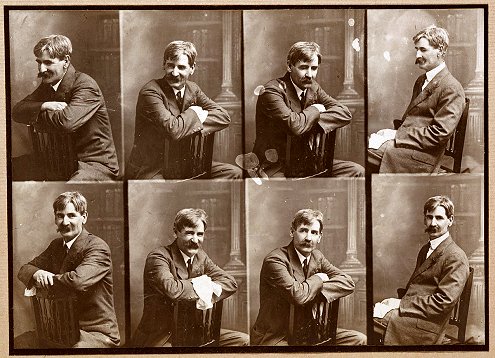
H e n r y L a w s o n
(1867-1922)
Interlude
Callaghan’s Hotel
There’s the same old coaching stable that was used by Cobb and Co.,
And the yard the coaches stood in more than sixty years ago;
And the public-private parlour, where they serve the passing swell,
Was the shoeing forge and smithy up at Callaghan’s Hotel.
There’s the same old walls and woodwork that our fathers built to last,
And the same old doors and wainscot and the windows of the past;
And the same old nooks and corners where the Jim-Jams used to dwell;
But the Fantods dance no longer up at Callaghan’s Hotel.
There are memories of old days that were red instead of blue;
In the time of “Dick the Devil” and of other devils too;
But perhaps they went to Heaven and are angels, doing well–
They were always open-hearted up at Callaghan’s Hotel.
Then the new chum, broken-hearted, and with boots all broken too,
Got another pair of bluchers, and a quid to see him through;
And the old chum got a bottle, who was down and suffering Hell;–
And no tucker-bag went empty out of Callaghan’s Hotel.
And I sit and think in sorrow of the nights that I have seen,
When we fought with chairs and bottles for the orange and the green;
For the peace of poor old Ireland, till they rang the breakfast bell–
And the honour of Old England, up at Callaghan’s Hotel.
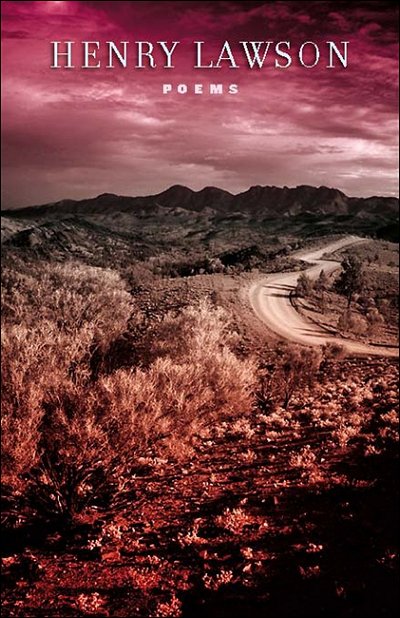
A Mixed Battle Song
Lo! the Boar’s tail is salted, and the Kangaroo’s exalted,
And his right eye is extinguished by a man-o’-warsman’s cap;
He is flying round the fences where the Southern Sea commences,
And he’s very much excited for a quiet sort of chap.
For his ships have had a scrap and they’ve marked it on the map
Where the H.M.A.S. Sydney dropped across a German trap.
So the Kangaroo’s a-chasing of his Blessed Self, and racing
From Cape York right round to Leeuwin, from the coast to Nevertire;
And of him need be no more said, save that to the tail aforesaid
Is the Blue Australian Ensign firmly fixed with copper wire.
(When he’s filled the map with white men there’ll be little to desire.)
I was sulky, I was moody (I’m inclined to being broody)
When the news appeared in Sydney, bringing joy and bringing tears,
(There’s an undertone of sorrow that you’ll understand to-morrow)
And I felt a something in me that had not been there for years.
Though I lean in the direction of most absolute Protection
(And of wheat on the selection)
And, considering Congestion and the hopeless unemployed,
I’d a notion (but I hid it) that, the way the Emden did it,
‘Twould be better for Australia if her “commerce” was destroyed.
You may say that war’s a curse, but the peace curse may be worse,
When it’s lasted till it’s rotten–rotten from the inmost core,
To the mouldy skin which we are, in the land we call the freer–
And I almost feel inclined to call for “Three Cheers for the War!”
For I think, when all is over, from Magellan’s Straits to Dover,
Things will be a great deal better than they ever were before.
But, since “Peace” and “Right” are squalling, I’ll content myself with calling
For three rousers–like the ringing cheers we used to give of yore–
For the Emden!
For the Sydney!
And their gallant crews and captains–both of whom we’ve met before!
And, for Kaiser William’s nevvy, we shall venture three cheers more!
Cheers that go to end a war.
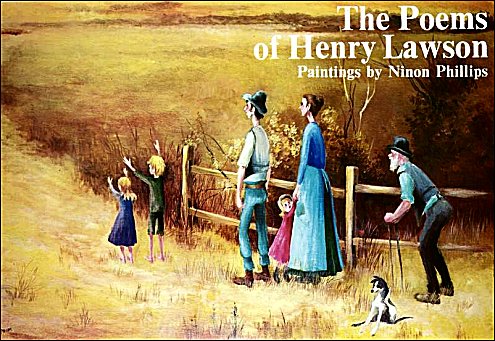
Somewhere up in Queensland
He’s somewhere up in Queensland,
The old folks used to say;
He’s somewhere up in Queensland,
The people say to-day.
But Somewhere (up in Queensland)
That uncle used to know–
That filled our hearts with wonder,
Seems vanished long ago.
He’s gone to Queensland, droving,
The old folks used to say;
He’s gone to Queensland, droving,
The people say to-day.
But “gone to Queensland, droving,”
Might mean, in language plain,
He follows stock in buggies,
And gets supplies by train.
He’s knocking round in Queensland,
The old folks used to say;
He’s gone to Queensland, roving,
His sweetheart says to-day.
But “gone to Queensland, roving”
By mighty plain and scrub,
Might mean he drives a motor-car
For Missus Moneygrub.
He’s looking for new country,
The old folks used to say;
Our boy has gone exploring,
Fond parents say to-day.
“Exploring” out in Queensland
Might only mean to some
He’s salesman in “the drapery”
Of a bush emporium.
To somewhere up in Queensland
Went Tom and Ted and Jack;
From somewhere up in Queensland
The dusty cheques come back:
From somewhere up in Queensland
Brown drovers used to come,
And someone up in Queensland
Kept many a southern home.
Somewhere up in Queensland,
How many black sheep roam,
Who never write a letter,
And never think of home.
For someone up in Queensland
How many a mother spoke;
For someone up in Queensland
How many a girl’s heart broke.

Down in the River
I’ve done with joys an’ misery,
An’ why should I repine?
There’s no one knows the past but me
An’ that ol’ dog o’ mine.
We camp an’ walk an’ camp an’ walk,
An’ find it fairly good;
He can do anything but talk,
An’ he wouldn’t if he could.
We sits an’ thinks beside the fire,
With all the stars a-shine,
An’ no one knows our thoughts but me
An’ that there dog o’ mine.
We has our Johnny-cake an’ “scrag,”
An’ finds ’em fairly good;
He can do anything but talk,
An’ he wouldn’t if he could.
He gets a ‘possum now an’ then,
I cooks it on the fire;
He has his water, me my tea–
What more could we desire?
He gets a rabbit when he likes,
We finds it pretty good;
He can do anything but talk,
An’ he wouldn’t if he could.
I has me smoke, he has his rest,
When sunset’s gettin’ dim;
An’ if I do get drunk at times,
It’s all the same to him.
So long’s he’s got me swag to mind,
He thinks that times is good;
He can do anything but talk,
An’ he wouldn’t if he could.
He gets his tucker from the cook,
For cook is good to him,
An’ when I sobers up a bit,
He goes an’ has a swim.
He likes the rivers where I fish,
An’ all the world is good;
He can do anything but talk,
An’ he wouldn’t if he could.

Henri Lawson: Four Poems
fleursdumal.nl magazine
More in: Archive K-L, Lawson, Henry
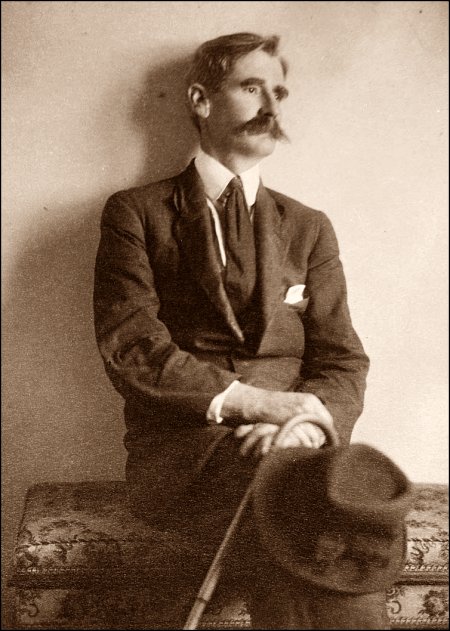
H e n r y L a w s o n
(1867-1922)
A Bush Girl
She’s milking in the rain and dark,
As did her mother in the past.
The wretched shed of poles and bark,
Rent by the wind, is leaking fast.
She sees the “home-roof” black and low,
Where, balefully, the hut-fire gleams–
And, like her mother, long ago,
She has her dreams; she has her dreams.
The daybreak haunts the dreary scene,
The brooding ridge, the blue-grey bush,
The “yard” where all her years have been,
Is ankle-deep in dung and slush;
She shivers as the hour drags on,
Her threadbare dress of sackcloth seems–
But, like her mother, years agone,
She has her dreams; she has her dreams.
The sullen “breakfast” where they cut
The blackened “junk.” The lowering face,
As though a crime were in the hut,
As though a curse was on the place;
The muttered question and reply,
The tread that shakes the rotting beams,
The nagging mother, thin and dry–
God help the girl! She has her dreams.
Then for “th’ separator” start,
Most wretched hour in all her life,
With “horse” and harness, dress and cart,
No Chinaman would give his “wife”;
Her heart is sick for light and love,
Her face is often fair and sweet,
And her intelligence above
The minds of all she’s like to meet.
She reads, by slush-lamp light, may be,
When she has dragged her dreary round,
And dreams of cities by the sea
(Where butter’s up, so much the pound),
Of different men from those she knows,
Of shining tides and broad, bright streams;
Of theatres and city shows,
And her release! She has her dreams.
Could I gain her a little rest,
A little light, if but for one,
I think that it would be the best
Of any good I may have done.
But, after all, the paths we go
Are not so glorious as they seem,
And–if t’will help her heart to know–
I’ve had my dream. ‘Twas but a dream.
Henry Lawson poetry
fleursdumal.nl magazine
More in: Archive K-L, Lawson, Henry
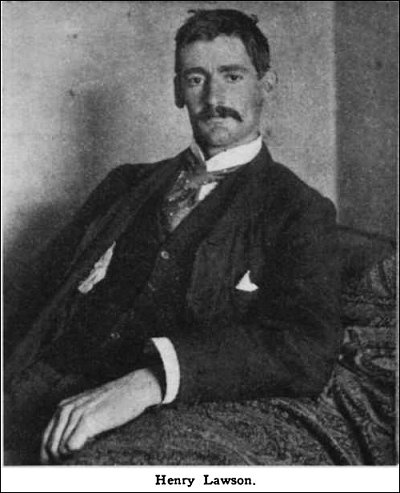
H e n r y L a w s o n
(1867-1922)
The Unknown God
A Phantasy of Optimism
The President to Kingdoms,
As in the Days of Old;
The King to the Republic,
As it had been foretold.
They could not read the spelling,
They would not hear the call;
They would not brook the telling
Of Writing on the Wall.
I buy my Peace with Slaughter,
With Peace I fashion War;
I drown the land with water,
With land I build the shore.
I walk with Son and Daughter
Where Ocean rolled before.
I build a town where sea was
A tower where tempests roar.
From bays in distant islands,
And rocks in lonely seas,
With unseen Death in silence
I smite mine enemies!
The great Cathedral crashes
Where once a city stood;
I build again on ashes
And breed on clotted blood!
I link the seas together,
And at my sign and will
The train runs on the ocean bed,
The great ship climbs the hill!
For pastime I flood deserts
With water from the rill;
And in my tireless leisure hours
I empty lakes, and fill.
I plumb the seas beneath us
And fathom skies above,
Yet I make Peace for hatred
And I make War for love.
I race beneath the ranges
And sit where Mystery dwells–
Yet mankind sees no changes,
They ask for “miracles!”
I own the world and span its
Lone lands from Pole to Pole;
I live in other planets,
Yet do not know my soul–
The soul that none may fathom,
Whose secrets none may tell,
The soul that none may humble,
The Soul Unconquerable!
I am the God of Ages!
I am the Unknown God!
My life is written pages
Wherever man hath trod.
From bounds of Polar regions,
To where the Desert reigns,
I’ve left my myriad legions
On countless vanished plains.
And I shall reign for ever
On earth while oceans roll,
In shape of man, or woman,
Through my immortal soul;
Yet I can love and suffer,
Be angry, or be mild,
And I can bow me down and weep
Just like a mortal child.
I conquer Death and Living,
And Fiends in shape of men,
For I rejoice in giving
Not to receive again.
For I am Man!–and Mortal!
And Mammon’s Towers must fall,
Though Greed draws all his pencils through
The Writing on the Wall!

Henry Lawson: The Unknow God
fleursdumal.nl magazine
More in: Archive K-L, Lawson, Henry
Thank you for reading Fleurs du Mal - magazine for art & literature